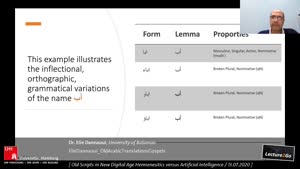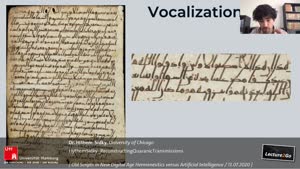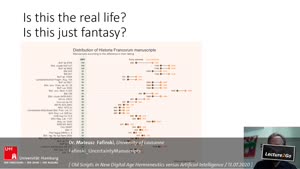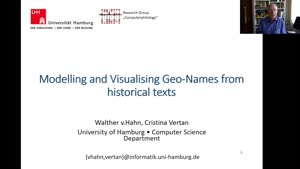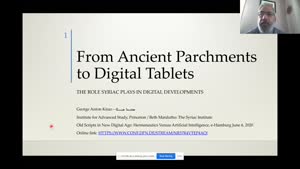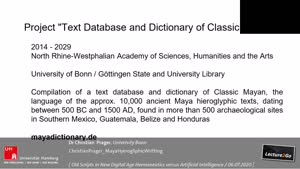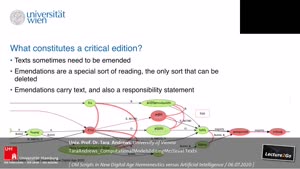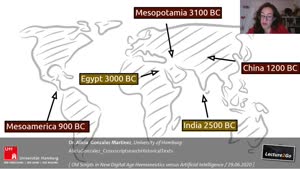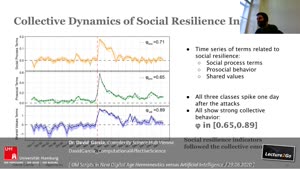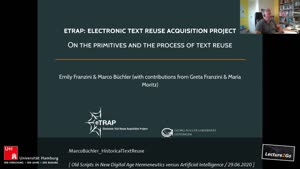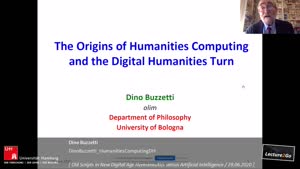TaraAndrews_ComputationalModelsEditingMedieval Texts - Univ. Prof. Dr. Tara Andrews - Universität Hamburg
- Lecture2Go
- Videokatalog
- F.6 - Mathematik, Informatik, Naturwissenschaften
- Informatik
- Old Scripts in New Digital Age Hermeneutics versus Artificial Intelligence
Videokatalog
TaraAndrews_ComputationalModelsEditingMedieval Texts
Tara Andrews, University of Vienna, Austria, “Computational Models for Editing Medieval Texts: The Case of Matthew of Edessa"
What are the consequences for data modelling when we think of critical edition not as a document, but as a process? In this talk I will outline such a process-based approach, adopted in the upcoming digital edition “The Chronicle of Matthew of Edessa Online”, in which the logic of edition is modelled not merely in the data format, but also in the associated computer code, embedding logic that allows the editor to define custom answers to question such as the following:
- What constitutes a reading, in what context(s)? A lemma reading? A variant?
- How should variants be classified? What implicit hierarchy, if any, does the editor’s classification scheme have and what are the implications?
- How should the text be subdivided, and in what order(s) should these subdivisions be read?
- What kind of information is carried within the text, and how can that be expressed?
Most crucially, the process model allows the answers to these questions to be enforced consistently within the project, with the useful side effect of compelling the editor to reconsider assumptions that turn out not to be adequate. The result, as we hope to demonstrate, is a digital critical edition that inherently captures, not only the resulting text, but also the intellectual process by which it is produced.
---
Einführungstext:
The digitalization campaign during the last years made available a big number of manuscripts, printed books, inscriptions, to a broad public. Most of them remain inaccessible for non-specialists for several reasons: the script cannot be deciphered, the language disappeared or its historical variants differ too much from the modern one, the semantics of the words changed or the conceptual space is completely different from ours. Computational methods and especially artificial intelligence offer powerful mechanisms to bring these rich cultural heritage assets into new light, made them transparent and more accessible for non-specialists and allow also more interdisciplinary collaboration. On the other hand, processing these documents implies often the rethinking and adaptation of established paradigms in the computer science and the embedding of principles of the ground method in humanities „hermeneutics”.
In this public lecture series, we invite internationally renowned scholars working in the cutting- edge domain of digital culture heritage to present current approaches of using computational methods on old scripts, show benefits, discuss the change of paradigm in humanistic interpretation and address also limitation of machines. The talk will address a broad spectrum of scripts and languages among them Arabic, classical Ethiopic, Coptic, Latin, classical Greek, old German.
The series of lectures is supported by the Project HerCoRe (https://www.inf.uni-hamburg.de/inst/dmp/hercore/projects.html) financed by the Volkswagen Foundation and the ERC Project COHBUNI (https://www.cobhuni.uni-hamburg.de/project.html)
Organisers: Dr. Cristina Vertan, Prof. i.R. Dr. Walther v. Hahn (MIN, Dept. Informatik), Dr. Alicia Gonzalez Martinez (AAI, Facultät für Geisteswissenschaften)

